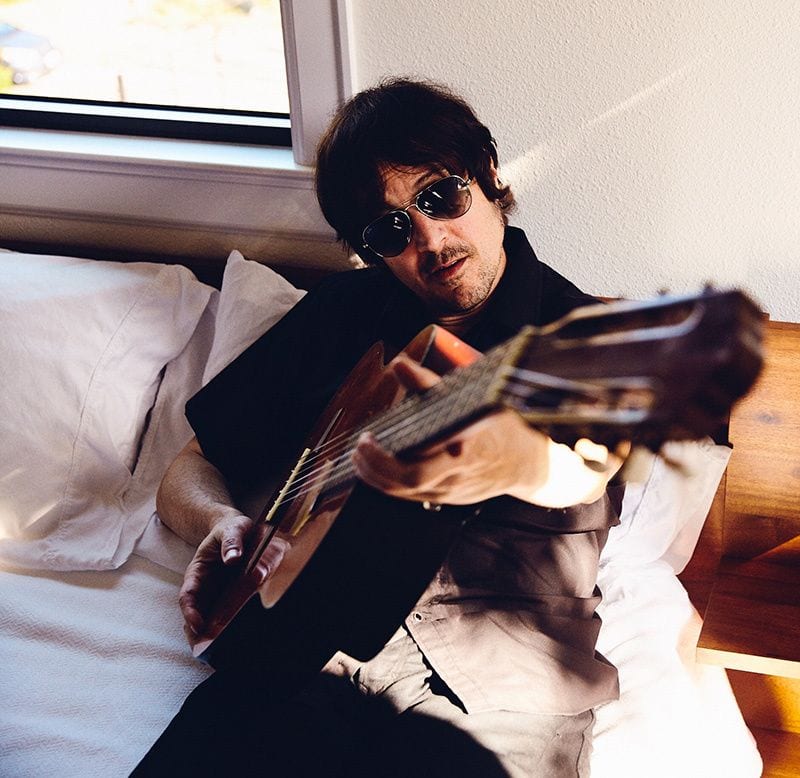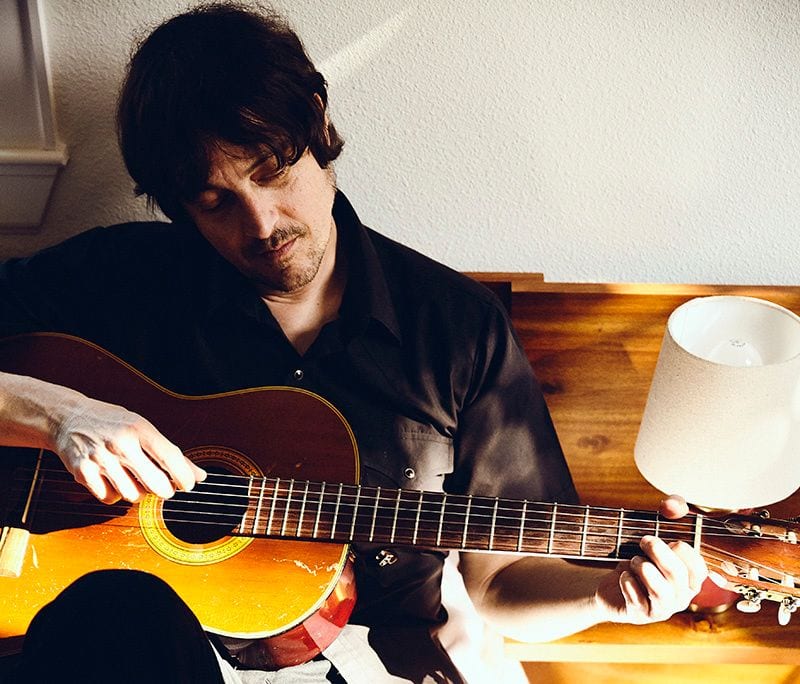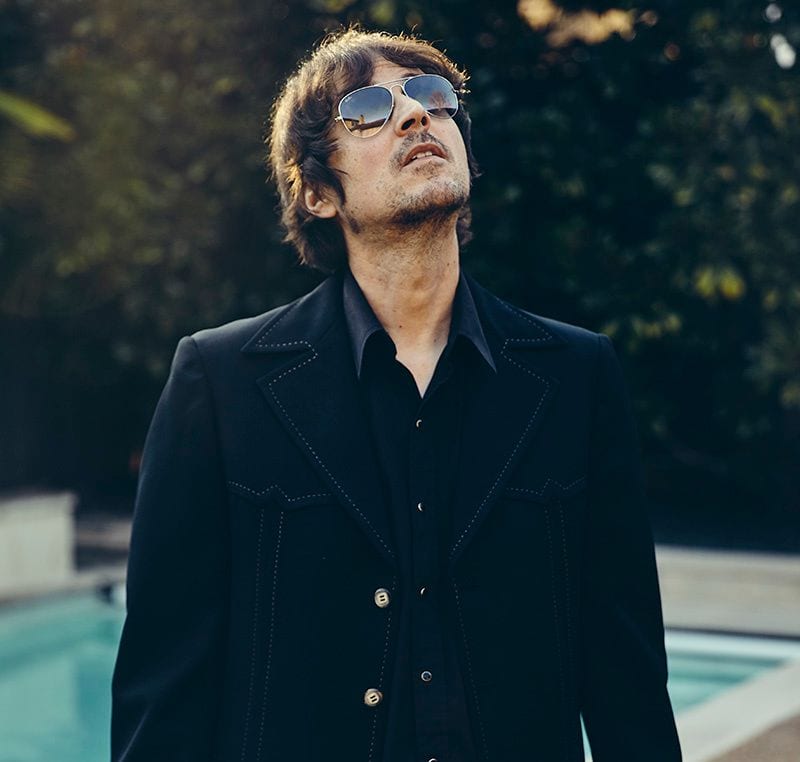
In 2008, PopMatters caught up with Dallas-based singer-songwriter and producer Salim Nourallah. At that time, we talked about the beginnings of both his career and his family. Now, ten years later, both Nourallah’s music and his personal life have taken sharp turns. Given Nourallah’s new outlook and new album Somewhere South of Sane, it’s time for us to check in again.
When we left Salim Nourallah a decade ago, he had just recently put out Snowing in My Heart, an album that would prove to be an artistic turning point (at the time he called it “the end of something for me” and now cites it as “the end of an era”) as well as a marker of significant life changes. The record was a massive production, with a large band, and a huge CD release party. He points to the fact that “Snowing was the biggest assemblage of all these various people that were playing. There was an army of friends. That was something that I’ve never done again. I had fun with that. It felt a little over the top.” The expansiveness was the culmination of a three-album run of Nourallah “getting off the ground as a solo act”. While he says it’s “the most head-scratching of all my records,” it felt like a natural sort of conclusion to his vision at the time.
Before his career and life would take a significant turn, though, he put out an album that, nearly a decade on, feels like a moment between two major career phases. Constellation from 2009 blended some of his low-key work with his power-pop roots. At the time, he was “pining to make one like the Nourallah Brothers” album, working with a small group (primarily Billy Harvey in this case).
“Constellation was moving away from this feeling that I needed to establish myself, following the blueprint that the Nourallah Brothers record did, expanding it and doing things on my own,” he says. “When you start playing shows, it has a way of informing the records. Snowing was influenced a bit by that. I wanted to make a record that you felt like you could go play. But there were only a few that felt good live and only a few that have survived to later setlists.”
Nourallah’s never been shy about bringing his own experiences into his music, and the impact of his children on his songwriting has been apparent on tracks like “Miette” and “The World Is Full of People Who Want to Hurt You”. Looking back, Constellation “was the calm before the storm.” Nourallah’s personal life would shortly become more turbulent, and it’s not reasonable to see that change reflected in the following string of albums.
“Moving into the next chapter was a lot of turmoil and upheaval and trying to hang on to the side of the plane,” he explains.
The troubled autobiographical elements of the songwriting might not have been apparent at the time (and primarily still aren’t), but 2012’s Hit Parade provided the greatest surprise in Nourallah’s oeuvre. He drew heavily on familial thoughts for his songwriting, thinking through parenthood, marriage, and related topics with an unusually energized maturity. Without sacrificing his pure pop, Nourallah and his new band (the Treefort 5) gained more of an edge, echoing the Who in spots. The release was funny, ambitious, and brash, and an utter joy to discover.
“Hit Parade was when things had gotten really bad,” Nourallah says.
He explains that during the time he was writing and recording that album, he was having financial problems, and was constantly “working and scrambling” while “just trying to plug the holes in the dike”. This struggle would inform the album, and prompt songwriting that would return on 2018’s “I Missed My Own Life”. At the center of everything were Nourallah’s domestic concerns, particularly his marriage.
“If the central relationship you’ve built your family around is going south, that’s another thing.”

Despite its circumstances, Hit Parade is a remarkable artistic success, full of hooks, humor, and emotion. The follow-up album Skeleton Closet took the performance one step further, adding a particular weirdness to the new rock song. Part of the album’s sound came from Nourallah pushing himself, but part of it came from his collaborators, particularly, in this case, guitarist Nick Earl.
“I was really caught up with working with Nick,” Nourallah says. “He’s like a mad scientist.”
Earl experiments with his sound, whether through effects, bowing technique, or strange equipment. When I spoke with him several years ago, he was getting a sound I couldn’t identify on this guitar by applying some gadget he’d found at Walgreens to it.
Nourallah’s willingness to draw inspiration from his bandmates has served him well. He speaks highly of Joe Reyes – whose band Buttercup Nourallah had produced – pointing out that he’s “a melody guy”, giving him credit for the chorus on “Dead Man’s Stare” from Skeleton Closet. The guitarists may have defined that pair of releases, but Nourallah speaks of the way various collaborators have influenced him.
“I’ve been so lucky to have these incredible talented and humble friends and musicians,” he says. “A lot of the moves I’ve made have been influenced by that. They’ll come into my life and blow my mind and I’m inspired by that.”
After Skeleton Closet came a three-year gap between albums (“I’ve never pushed myself to write because I need to write. There’s no manager banging on my door. A lot of missteps have been made by the manager banging on the door,” laughs Nourallah), but now he’s released another unexpected album, Somewhere South of Sane. Early conversations suggested the upcoming album would be a relaxed affair, more folk and Nick Drake than anything, but the recently released versions makes for a far broader experience, touching on various genres and moods, from whispers to screams, all in a coherent package.
“This is the first record I’ve ever made,” he says. “The entire thing was influenced by making a record and not a CD.”
The double-album has four parts, each fit together purposefully, with the fourth side being the craziest. The vinyl packaging includes lyrics and extensive notes on the songs, a design inspired by Nourallah’s teenage days, and how he “always liked it when artists made a little more effort to share things.” The notes here offer personal information, although Nourallah’s careful with what he reveals, making sure not to “talk about things that don’t need to be aired publicly,” particularly when it comes to the end of his marriage.
Somewhere comes from a confluence of the creative and the personal. Though he shares credits with quite a number of musicians, it’s often Earl’s strangeness that provides the textures, and his own openness (always a key part of his writing) that takes the music to intimate places. The album, sensibly enough, opens with an origin story, “Boy in a Record Shop”, and traces loss and love, ending with sadness while never giving up hope.
The album contains almost no percussion, and Nourallah, who often writes on inspiration, says, “When these songs were coming in, I knew this wasn’t going to be a beat record.”
Few of the songs have any percussion. “Relief” has drums, and an unlikely origin. Nourallah recorded it in Austin at Marty McGuire’s studio was writing songs for her and Emily Robinson. Engineer Kyle Crusham (who also appeared on Skeleton Closet) said, “We have to cut it today,” and it ended up on the album. Other songs have “percussion elements”, like the drum loop on “Robot”, but there are no songs, according to Nourallah, “where the drummer is sitting at the kit”.
That fact, along with the various styles on the album, makes it hard to classify.
“It’s not a folk record, an Americana record,” Nourallah said. “You have all these labels if it’s not a beat record with drums and things. Making it, I knew it would already make it hard for some people to classify.”
Regardless of the final style, as he began each song, Nourallah would go straight to his studio on his own and record the song with just his acoustic guitar and vocal, sometimes while still working on the lyrics. Those recordings provided the general template for each song, but Nourallah “wanted to push a little more,” and that’s where Earl came in.

“Nick has a way of making sonic worlds, it’s almost cinematic, taking something one-dimensional and making it Panavision,” Nourallah says. “‘Boy’ is a good example. If you just heard my voice and guitar, it’s hopefully compelling. When Nick came in, I felt and saw the desert. He brought in this psychedelic element. It’s a good example of what I feel like his collaboration did – each song had this little world of its own.”
Those little worlds coalesce into an epic about life in your 40s, with its demands and “loss, suffering, rebuilding”. While “Boy” provides the background, nothing else looks nearly that far back, despite Nourallah’s knack for smart reflection on the past throughout his other albums. Now he’s considering how to live through the demands, and wonder, of his current life.
“I Missed My Own Life”, originally written alongside the Hit Parade songs, considers one of those issues, missing out on the key parts of our life while we’re caught in the busyness of life. Nourallah finds a steady challenge in trying to be present.
“Hit Parade was a time when I was definitely not feeling super-present,” he says. “At some point you find there’s not enough time in the day to stay on top of things. It’s hard to be present. It’s a mad scramble. ‘I Missed My Own Life’ is a lament about that. It’s me fast-forwarding to the end of my life and looking back with sadness that I’ve missed the most important thing: my children growing up. It’s our one big opportunity to wake up. Our beautiful children are changing literally before our eyes, morphing so quickly, and we have this very small window where we have their company. That was the catalyst for me going, ‘I don’t want to live like this. I don’t want to do this.'”
Nourallah structures his life to maximize his limited time with his children.
“I work like a madman when my kids aren’t around,” he says, “so that when they are around, I can spend time with them and not be distracted by all these things. But that’s something that divorced people can do. ‘Moving Man’ deals with that. I got some tutoring early from divorced friends of mine: work like crazy – you’ll drive yourself nuts missing them. When you see them, have all that other stuff taken care of. It was golden, golden advice.”
As these sorts of meditations add up, the record could have turned dark, but Nourallah doesn’t let it go too far, using a friend’s phrase “hopeful melancholy” to describe the general feel of the album. “Let Go of the Night” and “Relief” both offer respite. “Rainbow Dolphins” is a “straight-up love song”, a rarity in Nourallah’s catalog. “Whiteheart” is about the search for healing.
In a strange twist, the final side of the album “goes off the rails”. In an album full of careful searching through darkness, the last few cuts just dive into the pit. “Is This Where the Trouble Begins” is ostensibly the darkest of the lot, complete with screaming, but it functions almost like a epiphany for the final run of the album. The track questions how many of issues come from within our own minds. Nourallah says it considers “so often how human beings create trouble for themselves”, an important thought to keep in mind while dealing with the broader themes of the album.
While the album consistently looks at the present, Nourallah hasn’t rejected thinking about the past. Part of the work of understanding your current life is thinking through your past, readjusting old plans in order to move forward.
“I kind of had to step away from one dream that I had,” he says, “what I wanted my life with my family to look like, and ask, ‘What is there now?’ Five years later, I’m probably happier than I’ve ever been. All of these songs helped me in my quest to get to a happy place again.”
And so Nourallah continues to venture into new territory. He’s already started two more albums, including one that will be a band record with Marty Wilson-Piper from the Church, which the two started work on in Nashville.
“I’ve always been suspicious of this continued march that career musicians make, so I’m suspicious of myself, as well,” he says, but it’s hard to imagine Nourallah ever putting his guitar and his pen. Or, for that matter, his boombox, his charmingly odd accompaniment at solo shows.
He’s also entered into a completely unexpected venture, “co-running” the Palo Santo Records label along with founder/owner Sarah Henry and Alex Dezen (the Damnwells, Broken Baby). The label includes some young artists as well as some vinyl reissues, including The Loyal Serpent, the 1997 solo album from Diesel Park West’s John Butler. There are connections to classic pop here, but with forays into other sounds, like Broken Baby’s post-punk.

Nourallah says his involvement with a label “wouldn’t have happened if my life stayed the same. Palo Santo’s a big part of the way that ten years later things have changed. I never, ever thought I’d be involved in putting out records by other people, putting out reissues. That’s kind of been mind-blowing.”
Nourallah’s putting on a variety of music just as he’s broadened his sounds for his own release. At this point in his career, and with a mindset shaped by both professional and private events, he has the sort of freedom to do what he wants to.
“It’s one of the things that feels really good about being my age and this far into making music,” he says. “My influences have disappeared. I’m influenced more by my own past. When you start out, you’re not like that. Maybe it’s the first time I’ve taken note of it. All of these elements have been somehow tied up in all of this more than in any of the music I listen to.
“It’s one of the good things about being obscure. I can pretty much move in any direction I want to move in. There’s no one questioning what direction I’m moving in. Will the fans be disappointed because I made a record with no drums? I feel like I’ve been able to thrive in that because it really suits me.”
It hasn’t been an easy decade for Nourallah by any stretch, particularly in his private life (including the loss of his mom this past May). Somewhere South of Sane gathers a decade and more of experience into a rare sort of creation, carrying adjectives like “mature” and “reflective” with energy while filling a double album with focus. Wherever the “somewhere” of the album is, Nourallah manages both to surprise and to continue doing exactly what he’s always done: turn a reflective life and a focus on family into unforgettable art.


![Call for Papers: All Things Reconsidered [MUSIC] May-August 2024](https://www.popmatters.com/wp-content/uploads/2024/04/all-things-reconsidered-call-music-may-2024-720x380.jpg)



